Hunting in Africa is an experience unrivaled anyplace on Earth for those wanting a vast range of game species, stunning scenery, century-old hunting customs, and the spice of risk. A hunt on the African continent will leave you with lifelong memories, whether you decide to go after plains game in southern Africa or go for Cape buffalo and elephant in the wilds of East Africa.
In some form, hunting is available in more than a dozen African countries. The majority of hunters travel to the southern African nations, particularly South Africa, Namibia, and Zimbabwe. These nations provide excellent hunting opportunities that are both accessible and economical, especially for beginners. Large wilderness regions and significant populations of dangerous game species, including lions, buffalo, leopards, and elephants, are found in East Africa, particularly in Tanzania, Ethiopia, and Mozambique.
Hunting in Africa offers something for everyone due to the broad range of geography, nations, and game species available.
In this post we are not focusing on planning, packing, and getting ready for your Safari. If that is what you are looking for, we have an extensive African Hunting Safari Planning Guide for that exact purpose. You can find it by clicking here.
In this article, we focus on the research part of African Hunting Safaris, giving hunters all the info you could ever need to understand Africa, African Hunting Safaris, and find the best hunt for you!
An African Hunting Safari can cost anything from $1 500 to upwards of a $100 000.
So, why such a broad spectrum of hunting costs? Well, Africa offers the most diverse range of species in the world, with some being more abundant and less regulated than others. Another key factor is that many outfitters are not fully transparent and additional costs stack up once you are in country (more on this later).
But, to answer this question in full we need to first consider that there are four main components to the African Hunting Safari cost:
Now, let’s look at these more closely to give you a good idea of what to expect, and why prices often differ:
1) Travel Cost to Africa
Whether you book first class or economy is entirely up to you, however you need to get to Africa. There isn’t much to elaborate on this point, other than to say the average cost of flights to South Africa from the USA is around $1500 – $2500, depending on your ticket and route. We have also found that a good route to fly, irrespective of your home country, is via Dubai. Your port of entry, most of the time, will be OR Tambo International in Johannesburg, South Africa. You may also click here to find up to date airline tickets.
2) The Safari Day Rate
To keep things simple, most African hunting outfitters offer an all-inclusive day rate, which covers your in-country transport, your accommodation, your meals, your drinks, your hunting guide, your hunting vehicle and other gear, and more. Here, the terms “most outfitters” & “and more” is key. When looking for a hunt, make sure to check, and if it is not available, ask for a complete list of included & excluded costs, and explicitly ask for a list of any additional charges that might apply.
3) The Animal Cost
This is where most of the differences in price come in to play. An Impala trophy might cost you as little as $300 depending on the outfitter, whereas a standard Leopard tag costs an average of $30 000. As you can see, the costs of your animal tags are completely dependent on what you want to hunt, and what you are prepared to pay. For an up-to-date Hunting Tag Pricelist, you can click here. An important note on animal tags is to make sure that the price quoted is for a trophy animal, if that is what you are going for. We have caught outfitters, more than once, offering clients extremely low tag costs only for the client to discover that they were purposefully obfuscated. The most popular tactic is to quote clients on cull-animals, and then pretend they didn’t know any better once you are in camp; forcing you to pay any amount they so wish for the trophy variant of said animal.
4) Taxidermy & Trophy Shipping
A good rule of thumb is that your Taxidermy costs will be around 50% of the trophy animal cost. You may also work on an average of $2 000 for shipping of the trophy to your home country. Please note that this is only averages, and exceptions apply. We will speak more in detail about taxidermy later in this post.
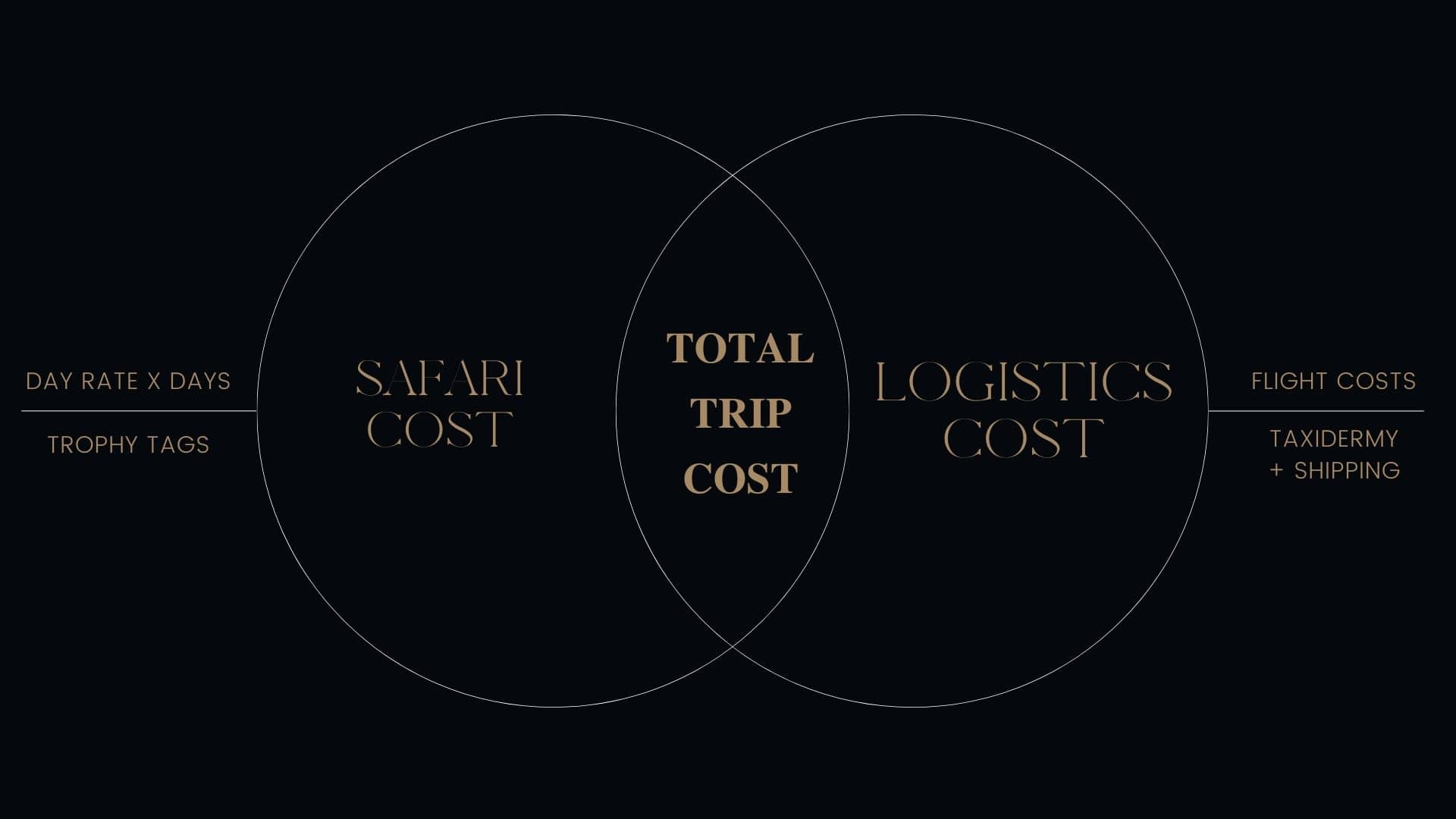
As you can see, there are a couple of functions which all come in to play for your final Safari cost. The only costs relevant to your chosen outfitter are the day-rates, and the trophy tag costs. But even then, many factors come in to play.
At Pioneer, we always recommend that hunters who visit Africa for the first time make use of a pre-made hunting package. Hunting packages are usually cheaper than custom made Safaris, but even more important is the convenience of knowing what the final amount is and knowing everything is included.
South Africa is the best Hunting Safari destination in Africa, and doubly so if this is your first hunting Safari.
Every hunter will give you a different answer to this question. Usually, this is because of an exceptional experience they had, and fairly so! Africa is an incredible destination, and each country or hunting block tends to offer a completely unique experience. Asking an outfitter this question is also of no help, as the answer will be whichever country they are more familiar with. So, let’s tackle this question as objectively as possible by breaking it up into the various components that make for an excellent Safari.
Logistically
South Africa is the closest thing to a first-world country you will find on the dark continent. In addition, South Africa is consistently voted in the top 10 best countries to visit for tourists. The nation hosts over 15 million tourists each year, with the majority of which enters through OR Tambo International, the same port of entry as for hunters. All this accumulates to one thing: a country overly prepared to accept, transport & protect tourism. The importance of efficient coordination in South Africa can be appreciated when you consider that tourism often contributes over 10% of South Africa’s GDP. That said, you should not expect the same transport network as you may be accustomed to at home. Nonetheless, out of all the countries hunters visit in Africa, South Africa is the clear leader.
Winner: South Africa
Healthcare
Frankly, you cannot rely on African public healthcare. Please make sure that you always have travelers’ insurance which includes medicare whenever you embark on a hunting Safari. Once you have done this, and private healthcare is considered, the clear leader in this field is South Africa. South African private medicare is world-class. This point needs no further explanation, there is no comparison to be made. Healthcare will be discussed in further details later in this post under the African Health Concerns section.
Winner: South Africa
Safety
If you start looking for safety concerns in Africa, you might not ever embark on this adventure. We will discuss African Safety Concerns in its own section later in this post, but the truth of the matter is this: You will be met by your hunting guide at the airport, and you will not leave their side until you are dropped off at the airport again. We are Africans, born and bred in Africa, and understand the African way. As long as you stay with your guide, you are as safe as you will be in your very own home.
Winner: Draw
Hunting Quality
The quality of the animals, facilities & general service you receive is an obvious and massive factor in choosing your hunting destination. We understand that. The fact is that South Africa and Namibia surpass any other hunting destination by a mile when it comes to facilities and service. This is mainly due to much better infrastructure, and the fact that most hunting areas in these two countries are generational family estates. This availability of resources and time.
When it comes to trophy quality however, the answer is not so clear. South Africa has a definite and clear advantage over other destinations in the sense that it has a very developed game breeding industry, which has the direct result of exceptional trophies. What South Africa, nor Namibia, has to offer though, is free range hunting. Free range hunting does not deliver the best trophy quality on a consistent basis, this is a fact. What it does offer however is the rare opportunity at a pure natural beast. It is hunter’s choice, but if you are looking for the best combination of quality facilities, service & consistent trophy quality, the clear leader is South Africa.
Winner: South Africa
Success
Hunting success is dramatically improved when you hunt on estates. Namibia and South Africa are renowned for their exceptional hunting estates and as such can nearly guarantee success on the animals you are looking for.
Winner: South Africa & Namibia
Cost
You are welcome to scour the internet for months at end but allow me to save you the time. South Africa offers the best value hunting in Africa. Period. Being the oldest, best developed and most popular hunting destination in Africa, South Africa offers the most bang for your buck.
Winner: South Africa
Adventure
Adventure to me is anything that sets your soul on fire. That makes you feel alive and makes you believe you are ten years younger. Like something akin to being a character in a novel. If this definition works for you, let’s roll with it.
As mentioned, South Africa and Namibia do not offer free range hunting. All hunting is fenced. However, some of these hunting estates are larger than life and you can be mistaken for categorizing them as free range. Take Pioneer’s Battlefields concession as an example. A famous area, once the battle grounds of the Anglo Boer war against the British Empire, this 20 000 Acre hunting estate has not seen a gunshot (apart from a select few Pioneer clients) since 1993. This is a place where hunters, unaccompanied by a guide familiar with the area, can get seriously lost.
Other countries such as Tanzania and Mozambique offer clients true free range. No fences, migrating animals, and an experience where even your guide is surprised at what can be found. If you consider all this in combination with a lack of modern infrastructure and a feeling of being truly disconnected form the world, then no other hunting areas on earth can compete.
In truth, a hunting Safari in Africa is always a fantastic adventure! It is up to you which type of adventure you are looking for.
Winner: Draw
Conclusion
We cannot say that one country is better than any other. When it comes to hunting many people value the adventure over anything else, and as you can see, all of Africa’s popular hunting destinations offer adventure in abundance. That said, if you are looking for an objective answer to which country is the best, if you could only choose one, the clear answer has to be South Africa.
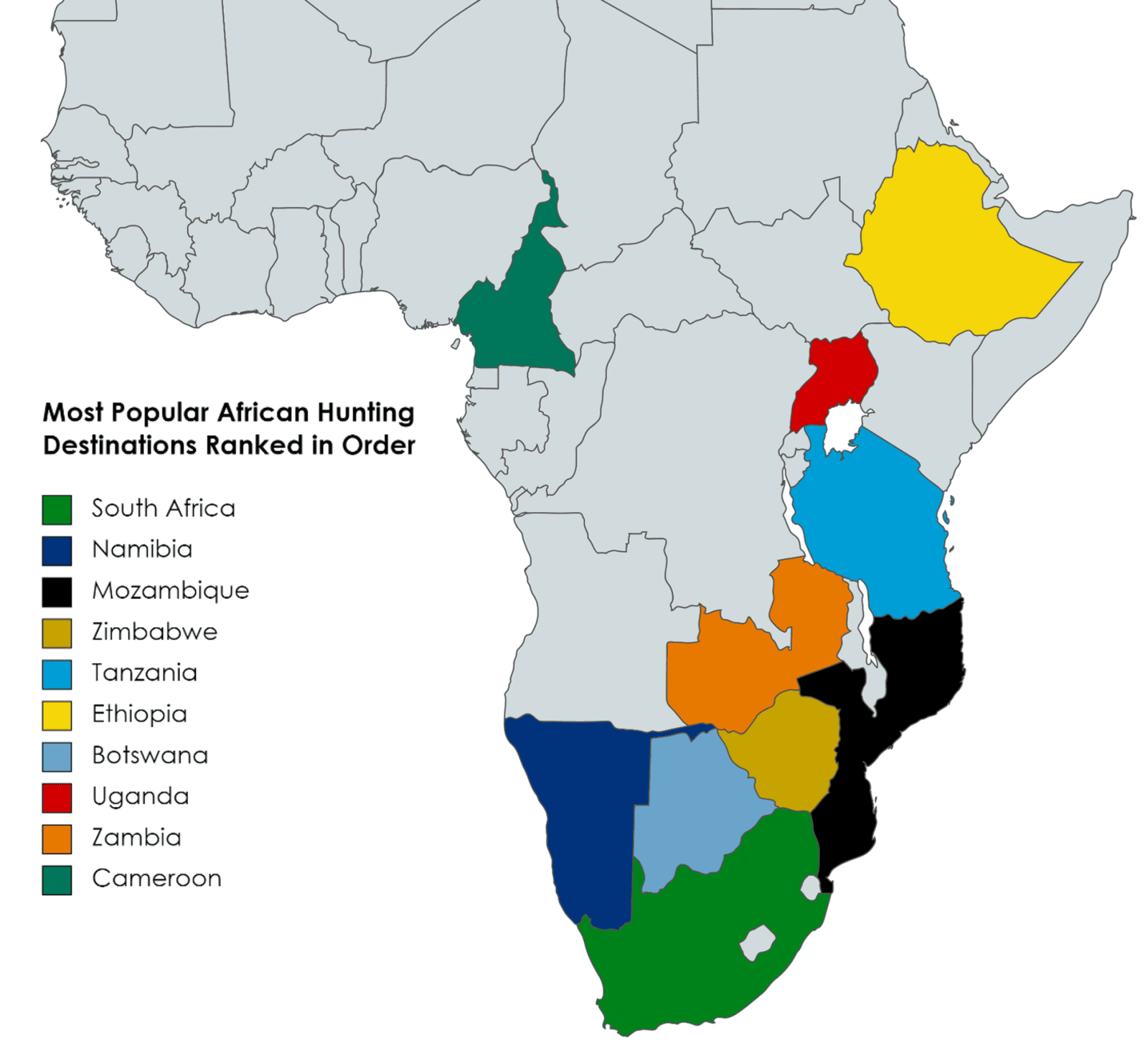
African hunting is done “safari-style,” with hunters being driven in open-topped trucks scouting for animals or game trails. Once spotted, you disembark the truck to follow your prey on foot.
Although the “Safari Style” hunting is by far the most popular hunting style in Africa, especially outside of South Africa & Namibia, other styles to exist. Let’s look at them in more detail.
Safari Style
Whether hunting in South Africa or the Congo, the Safari Style hunt is by far the most popular and successful choice. Most hunting areas in Africa are massive, flat, open areas with game in abundance around every corner. Africa also offers a wide range of species, with each hunter looking for something a little different. This means that we need to cover a lot of ground during your limited time here. The best way to do this is by making use of our modified trucks, geared with all the hunting equipment you could need. Accompanying you on the back of the track is usually your tracker, and sometimes even your hunting guide if a dedicated driver is available. The task of those on the back of the truck is to make use of their elevated position to scout for any signs of animals and tracks. When a promising opportunity arises, all conditions (sun / wind / cover) is considered, and an on-foot stalk is planned. If the hunt was successful, the required amount of field dressing is done promptly, and the trophy is loaded on the truck to be taken back to the lodge for proper hide care, skinning, and the preservation of the meat.
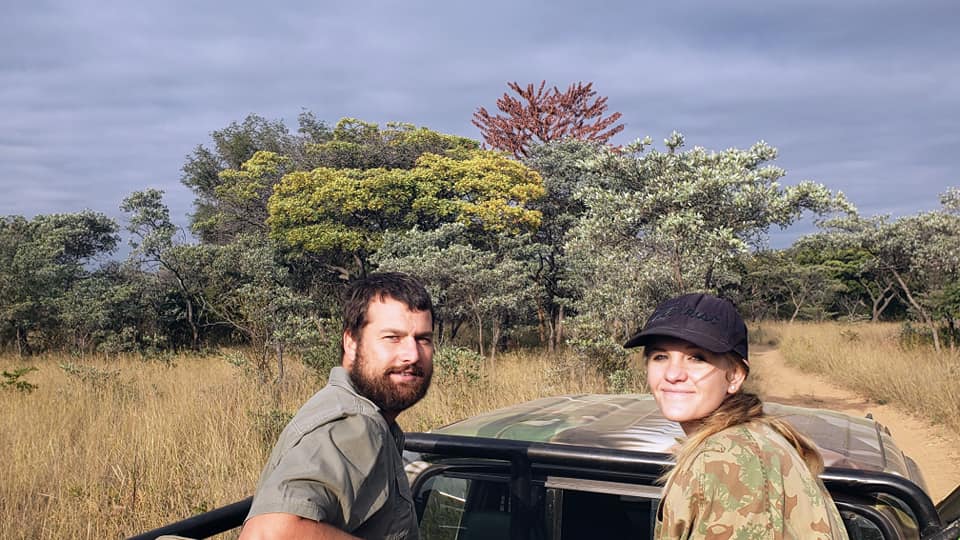
Sit Hunts
Sit hunts are most popularly done via blinds, and by bow hunters. Blinds in Africa, as in any other place, vary in size, style and objective. Sometimes outfitters may also put out some form of bait to lore animals in (such as a carcass for leopard) or have the blinds built originally on natural game paths or over water holes.
Driven Hunts
Driven hunts are less popular in Africa, and most common in the Western Cape Province, and Northern Cape province of South Africa. They differ from sit hunts mainly due to a less concealed waiting spot (often with the hunter’s location not being concealed at all in stark contrast to sit hunts which uses blinds); and the animals being driven to the hunter by horses or two-wheeler motorbikes (again, in contrast to blind hunts where a hunter waits for an animal to naturally walk past the blind).
Wing Shooting
Wing Shooting in Africa is rarely an outfitters primary business focus, but opportunities are available in abundance! Wing Shooting in Africa is conducted by packing enough supplies (ammunition and snacks) to satisfy hunters for a half-day, or sometimes a full day – hunter’s choice. You will be assisted by your hunting guide and the trackers who will help with reloading, managing the retrieving dogs, and offering you drink fill-ups and snacks.
Other Hunting Styles
All other hunting styles also exist in Africa but are less common and are usually only used due to circumstances. Ask your outfitter for more details if you have a particular hunting style in mind.
On your African Hunting Safari, you are allowed to hunt with rifles from .243 calibre all the way to your .500 of choice and beyond. You are also allowed to hunt with longbows, crossbows, compound bows, handguns, muzzle loaders and many other weapons.
Every country has their own laws and regulations, along with minimum calibre requirements. For example, in South Africa the law allows hunting of Impala with anything from a .243 rifle, but hunting Cape Buffalo requires at least a calibre of .375 H&H.
When it comes to bow hunting most hunters prefer a compound bow. Here, the law also dictates minimum draw weights for various species. Our recommendation is always to choose an outfitter and a hunting area specifically focusing on bow hunting. One such an example is Pioneer Safari’s Berchtesgaden estate, which has not only developed infrastructure specifically with bow hunters in mind, but also has a dedicated team who are bow hunting fanatics.
To answer this question directly: You will find a location in Africa, particularly in South Africa, where you can hunt with any reasonable and effective weapon. The best thing to do however is to speak to your outfitter directly and ensure your weapon meets the minimum requirement to hunt the species on your wish list.
Every outfitter offers a different array of huntable species, but with Pioneer Safaris you have a choice of over 45 species.
You’ve heard us say this before – Africa truly is a target rich environment. Dramatic and varying habitats and ecosystems mean that species have adapted over millennia to now offer hunters the most diverse range of species found anywhere in the world. Many species are also found in various sub-species, making for an even greater challenge. Did you know, for example, that four distinct and visibly differentiable species of Zebra exist? In addition, up to six species of zebra are debated among the scientific and hunting community. Another example of this is the clear scientific evidence indicating that the two highly debated species of bushbuck, are indeed two species and not even sub species. With the so-called Eastern Cape bushbuck being more closely related to Nyala, and the so-called Limpopo Bushbuck being more closely related to the Bongo and Sitatunga.
Most species however are in abundance in South Africa where many hunting estates accommodate them for the specific purpose of allowing hunters the opportunity at each. Many of these South African species are either naturally occurring, or in many cases introduced via the nations extensive and well-established game breeding industry.
When a hunter moves outside the realm of introduced species, the conversation becomes remarkably interesting. South Africa still holds the most diverse natural occurring species, but for hunters who are regulars to Africa, this extensive list is exhausted in four or five Safaris due to the effective and near perfected hunting methods of South African hunting guides. These hunters then start looking North to central and Eastern African nations which offer species not available in the Southern tip of the continent, such as the aforementioned Bongo & Sitatunga, and more species such as the Topi, Gerenuk or Grants Gazelle.
Another point that makes hunting in Africa so fun, is the relationship between animals, and also the colloquial classifications which has been established over the years. Terms such as big 5, dangerous 7, or spiral slam is of the most popular of these groups. In short, many species have been lumped into various “groups” which introduces an exceptional challenge for hunters. The Spiral Slam for example is a collection of four species which feature spiral shaped horns, namely the Eland, Kudu, Bushbuck & Nyala.
The answer to what you can hunt in Africa, is that you can hunt enough species to keep you busy for more than a decade worth of Safaris without ever hunting the same species again.
The most challenging hunt in Africa is the Tiny Ten antelope, which include Blue Duiker, Suni & Damara Dik Dik.
However, what does a challenge mean to you? Let’s explore how various species pose different challenges to help you find the answer you are looking for.
Most Difficult
The most difficult hunt in Africa is considered to be on the species belonging to the Tiny Ten group of animals. These small beauties are not only physically small, with some weighing as little as 5kg (11lbs), but extraordinarily clever. In fact, one of the species beloning to this group is the Duiker. Duiker is directly translated as “Diver”, and earned its name due to its instinctive behaviour to dive its small little body inside the nearest thick bush the moment they are alerted to any disturbance in the veld. Hunters will often walk right past these antelope if you are not vigilant enough.
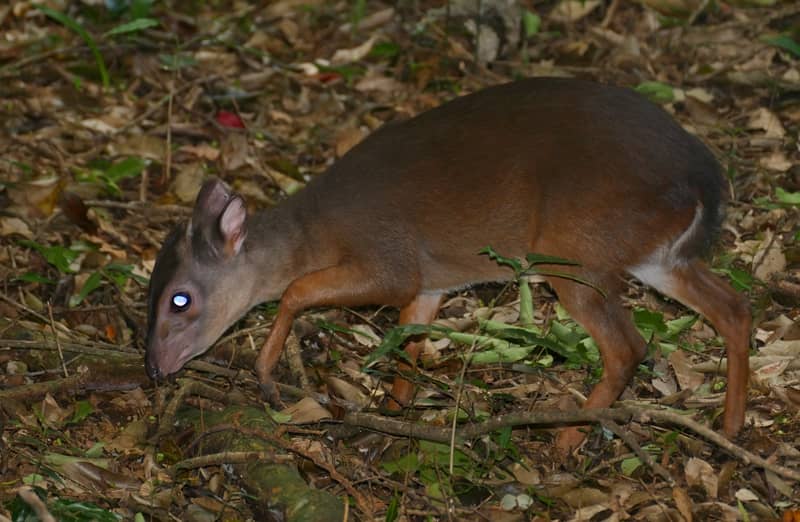
Most Dangerous
Featuring many nicknames, among which, “The Black Death”, the most dangerous hunt in Africa is without a doubt the Cape Buffalo. The Buffalo is the animal most responsible for hunting accidents and the primary on-duty cause of death for professional hunters. This is due to the Buffalo’s extremely stubborn nature, physical prowess, and of course their infamous desire for vengeance. At pioneer we are well aware of this fact and our Professional Hunters, your hunting guides, are well aware of this fact. Rest assured that irresponsible actions will not be taken and with a backup .500 in hand, your guide will ensure you remain as safe as possible.
Perhaps Robert Ruark said it best: “But I have a fear, a constant, steady fear that still crowds into my dreams, a fear that makes me sweat and smell bad in my sleep. I am afraid of Mbogo, the big, black Cape buffalo . . . I don’t know what there is about buffalo that frightens me so. Lions and leopards and rhinos excite me but don’t frighten me. But that buff is so big and mean and ugly and hard to stop, and vindictive and cruel and surly and ornery. He looks like he hates you personally. He looks like you owe him money. He looks like he is hunting you . . . He makes me sick in the stomach, and he makes my hands sweat, and he dries out my throat and my lips.”
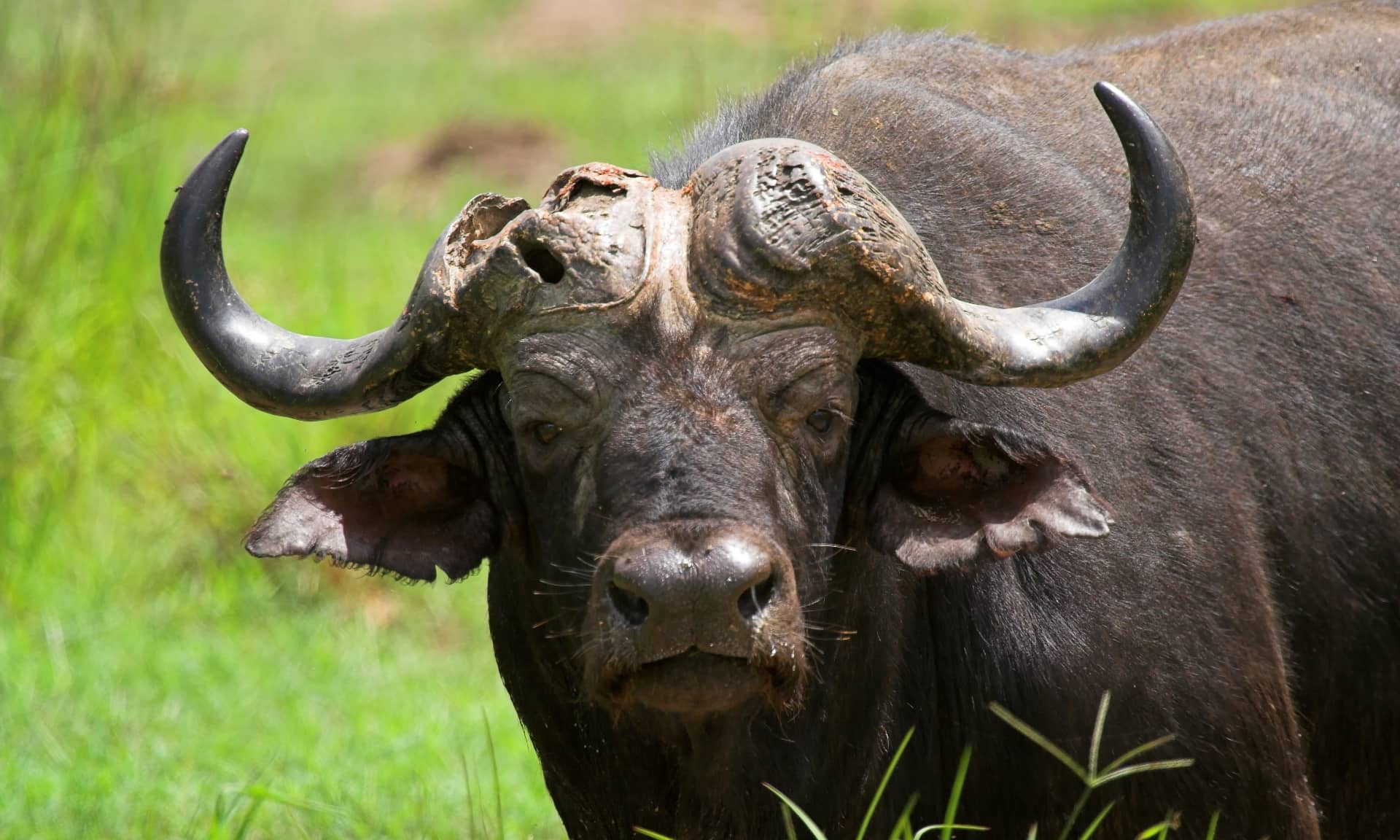
Most Adrenaline Rushing
If you are looking for a hunt that will get your blood flowing, Lion. Lions in their prime cover 100 yards in 3.5 seconds and have been recorded to keep this pace for up to 8 seconds – all while being dead silent and low to the ground. What can be more exhilarating than that? An animal with 4x the strength-to-weight of humans charging at you covering 100 yards in the time it takes you to shoot and reload. Combine this with the 4-inch canines you find on this 550-pound beast, and you have a formidable killing machine. Not to mention the deafening roaring and panting that accompanies an aggravated Lion, which is sure to send chills down your spine.
Luckily not all Lion hunts result in a charge, and the fact that you will have not one, but at least two experienced backup rifles standing by your side should give you some peace of mind. However, the knowing that this apex predator could turn and charge at any time earns hunting Lion the spot of the most adrenaline rushing hunt in Africa.
Most Physically Challenging
Any hunt in Africa can result in a physical challenge. Depending on location, circumstances and events, all African animals can take one on a tour to see the countryside. That said, some animals are notorious for hiding out in spots where vehicles can’t go, and the hike their and back is strenuous. Not to mention the spots these animals are located when you get a shot. So, which will it be, the Bushbuck? Reedbuck?
In my opinion. The Bongo has to be right up there as one of the most physically challenging hunts in Africa. That is, when you hunt it in its natural habitat. Bongo, commonly hunted in the Cameroon, requires a hunter to first travel to the forgotten parts of our planet. Once in camp, a large team of trackers meets you, all dedicated to finding Bongo in forests so thick and wild that it makes the Amazon look like a household garden. For days on end, you walk through the forest as it is simply not possible to drive through them. Your hike will not only be long, but you will be making new paths more than you are taking old paths. This is not even mentioning the unpredictable tropical forest weather, where heavy rain seems to come out of nowhere, drenching your already heavy hunting gear. After a successful hunt after a couple of days, the work is far from done. The Bongo now needs to be field dressed and recovered from these thick forests. Luckily though, you have a large team of local villagers standing by to assist with this task.
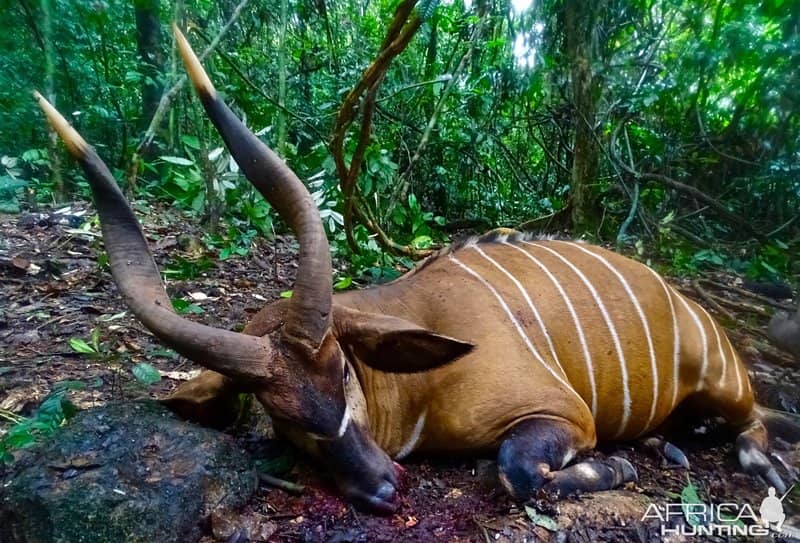
Government owned, public land hunting is available in Africa, but regulations make for a completely different concept to what American hunters are accustomed to back home.
Each country in Africa has different laws and regulations making this question difficult to answer. We get into hunting laws in a later section of this post. As a quick examples however:
The South African government passed a series of legislation in the mid- to late 1900’s in an effort to protect and preserve wildlife. Effectively these laws turned any animal on private land into the property of the landowner. In a country where four fifths of wild habitat is privately owned, it is clear that hunting on public land is extremely rare and expensive, subject to extreme government-set quotas.
In contrast, Mozambique is a nation where very little land is privately owned, but is either national reserves, or government land entrusted to the local tribes. Here, you will hunt almost exclusively “public land”, but it is not as easy as buying a hunting tag and off you go. Similarly to South African efforts, to ensure that hunting is well regulated and both habitats and animal populations are professionally managed, the governments of countries like Mozambique allow a limited number of registered hunting outfitters to hunt in these areas, each assigned a hunting block, or concession.
If you are looking for a public land, truly free-range hunting experience in Africa, Pioneer Safaris is one of the few outfitters who can take you into Mozambique for such an experience. Learn more about this opportunity here.
Animals hunted in Africa can be sent to African taxidermists, or the raw hides & skulls can be treated and shipped to your local taxidermist.
Hunters have two options when it comes to getting you trophies hunted on your African Hunting Safari home. The cost of these two options are more or less the same. Doing taxidermy in Africa tends to be cheaper, but the shipping is more expensive due to a larger freight. Having your taxidermy done by your local taxidermist tends to be more expensive, but the shipping costs are dramatically reduced to to a smaller physical size of the cargo. Let’s discuss your taxidermy options and explore the shipping process.
African Taxidermists
Having your taxidermy done in Africa has one big advantage: the local guys have more experience and a deeper understanding of the animal’s true expression and the feeling the trophy needs to express. Most outfitters also have special arrangements with the local taxidermist and might be able to negotiate a better price on your behalf if you request it.
Your Local Taxidermist
The main advantage of having the work done by your local taxidermist is that you know and trust them already. You can also physically visit them to inspect the work, or easily communicate with them at will without being a literal ocean apart.
Export Permits
Permits are not something you need to worry about. Between your outfitter and the shipping company / taxidermist, this will be handled on your behalf. During your Safari you will frequently be asked to confirm the entry made into a “hunting register” by your hunting guide. This hunting register is an official government issued book which makes four carbon copies of each entry. Each entry contains the hunter’s name, location hunted, species hunted, date hunted, and animal parts to be exported. It also contains some legal information such as the hunting permit number and registration numbers of the companies involved.
One copy of the hunting register information is given to you the client, another is kept by the outfitter, a third is sent to the government for official record keeping and the final carbon copy of your hunt entries accompany your trophies wherever they might go. This paperwork is used to verify all processes and ensure an easy export of your trophies.
Shipping Your Trophies
If you make use of an African taxidermist, they usually have an inhouse team who takes care of the shipping on your behalf.
If you wish to take the raw materials back home to your local taxidermist, you will need two things: First, you will need to have your trophy parts “dipped & packed” which is in short, the process of treating the hides and skulls to avoid hair slip and to remove any bacteria and parasites. The second thing you will need is a shipping company. Again, usually the companies who treats your raw hides & skulls will also be able to help you here, but if not there are plenty of companies who specialize in trophy shipping.
As in all cases, your outfitter should be able to assist you with information on the above and contact details to their preferred partners.
The most important African Hunting Law is that clients are not allowed to hunt without a Professional Hunter, who on their turn must operate under the license of a Hunting Outfitter.
If you’ve ever hunted in any country other than your own, you are familiar with the fact that each nation tends to legislate and regulate wildlife in quite different ways. Africa is no exception. However, as a client this is a non-issue for you as one law ensures that you are always covered under all conditions. The only law that you as a client need to know, is that in Africa you must always be accompanied by a qualified & accredited Professional Hunter, who operates under the license of a registered Hunting Outfitter, when you are hunting. Foreigners are not allowed to hunt in Africa without these conditions being met and doing so may lead to your prosecution as a poacher. The hunting Outfitter with whom you have booked is then responsible for ensuring that all hunting activities are legal and legitimate.
That’s it, chapter closed. Right? Well, yes, but the point of this post is to inform you as much as we can. So here are a couple of other laws and regulations to consider. As mentioned before, every African nation have different laws so we will be focusing on South Africa for now. Do note however that everything we say here is also a law in some shape or form in other African countries, so you may use this as a broad African guideline:
Rule #1, Always:
Foreign tourists hunting in South Africa is classified as a “Hunting Client”. Hunting Clients are under no circumstances allowed to hunt without being accompanied by a qualified Professional Hunter, who is himself, or otherwise operates under the employment of a registered Hunting Outfitter.
Hunting Permits
All animals hunted in Africa requires a hunting permit. Many animals such as Impala is covered under the so-called “P3 exemption”. If the hunting area on which you hunt has P3 exemption, Impala and other species do not require an individual permit by may be hunted under the P3 permit. Ask your outfitter about specific species if this is a concern.
Export permits
Export permits deserves an article of its own. However, it is important that you know one thing. Only make use of companies with a proven track record, and who comes highly recommended by your outfitter, to handle your hunted trophies. Irrelevant of whether it is dipping, taxidermy or shipping, do not take chances on an unproven company. If you are unsure and your outfitter cannot help you, feel free to reach out to us, or ask on the forums on popular hunting sites such as Let’s Hunt.
Recourse
Most African outfitters will treat you fairly and honourably. That is the one wonderful thing about this industry. However, if any disputes do arise, try to solve it calmly and professionally while in camp. Most African outfitters do not have the resources to fight clients in the courts of their home countries, and therefor explicitly states that any legal action will be taken in the country of their registration. Although recourse is possible, this puts an unnecessary burden on you as a client. It also taints the memory of what should be the greatest adventure of your life. Most hunting outfitters will not take it personally if you have any concerns, and in fact welcome any dialogue towards fixing your concerns. So, make sure to chat to them the moment you are unhappy about anything.
Firearms and Caliber Requirements
The Ordinance only forbids the use of.22 rimfire ammunition and contains very few other caliber restrictions or directives. Shotgun use is not allowed while hunting “Game” animals other than birds or hares. Semi-automatic or self-loading rifles may not be used to kill common or protected species, although they may be used to hunt “problem animals” and “wild animals that are not game.” Although your professional hunter will not permit the hunting of any animal with a weapon with insufficient killing capability for the particular animal, there are no limits on using muzzle-loaders or pistols for hunting. Almost any weapon may be used for hunting on P3-Exempted farms, where the majority of hunting by foreign tourists is done.
Bows and other String Weapons
African hunting law is slightly behind the curve when it comes to bow hunting. So make sure to ask your outfitter. As for South Africa, we can give you a quick roundup. South Africa allows bow hunting and crossbow hunting for plains game and dangerous game hunting except for elephants, black rhino, white rhino and crocodile.
Other Laws
Obviously, many other laws exist, but these are the most important as it pertains to your discovery and decision-making process of booking your next African Hunting Safari. As mentioned above, if you have any questions, feel free to ask your outfitter, they know the law. You are also more than welcome to contact us with any questions you might have.
Africa is a safe hunting destination. As you will be traveling with your hunting guide, you are very unlikely to witness, and less so fall victim to any crime.
If all the popular hunting destinations, you will find the most news and reports on crime in South Africa. However, it must be noted that South Africa is by far the most efficient in reporting crime statistics. So if the statistics aren’t reliable, how do we figure this one out?
Allow me, an 8th generation, born and bred African, to chime in here. I have travelled across the vast majority of Africa via the commercial routes and via self-driven overlanding. Much more the latter. Central Africa is as familiar to me as my brother-in-law, and Southern Africa is printed on the back of my hand. You can wake me up at three in the morning and I’ll happily create a Safari itinerary for you by heart. I know this place.
Here is my personal experience: South Africa is an extremely safe place to be if you refrain from going to the places you won’t be going on a Safari anyway. The same can be said for Botswana and Namibia, however these countries are extremely sparsely populated and as such I tend to feel the most comfortable to turn my back here, no matter what I am doing. Zimbabwe, Tanzania, Mozambique & Zambia are fantastic destinations, but can be unpredictable.
But the truth of the matter is that you will be accompanied by your hunting guide wherever you go. We know where the hotspots are and will under no circumstances take any client near them. Couple your physical separation from dangerous areas with good old common sense, and you will not be in danger at any point more than you would be back home.
A small caveat: Some destinations as mentioned are unpredictable. Tribalism and poverty are very real issues in Africa and as you might have read elsewhere, tensions do flare up from time to time. If you are hunting in any of the above-mentioned unpredictable areas, please speak to your outfitter first and specifically enquire about current unrests in these countries.
If a hunter takes the necessary precautions, like taking Malaria medication if you visit a Malaria area, you will not fall ill to any exotic diseases – Africa is a safe place to visit.
Due to poverty, a lack of general hygiene knowledge and the lack of proper public healthcare, Africa is a place with more health concerns than your home country. Another concern to you might be dangerous animals, snakes and parasitic diseases such as Malaria. However, taking the correct precautions and using common sense, you will not fall ill to any strange & exotic diseases. Let’s look at these concerns:
Snakes
Going on an African hunting safari during the continent’s winter months will reduce your chances of coming into contact with a snake (June – August). You shouldn’t let your fear of snakes keep you from going on safari if your schedule requires you to go at a different time. Hunters seldom get snakebites, so don’t let that stop you from taking advantage of Africa’s fantastic hunting.
Malaria
You won’t necessarily run the danger of getting malaria, or even being in an area where Malaria exists. Although those pesky mosquitos are found across Africa (as in the rest of the world) the areas where they carry Malaria is limited. To find out if you will be hunting in a malarial region, it is best to consult your outfitter. We are not medically trained professionals, and this does not constitute medical advice. Before visiting malaria areas, please seek medical advice from your doctor regarding medication. To put your mind at ease however, if you are visiting a Malaria region, your guides and outfitter will be well acquainted with the disease, with many of them having had it themselves multiple times.
Yellow Fever
South Africa does not require vaccinations against yellow fever. In countries where there have been outbreaks of yellow fever, vaccination records are required, and entry will likely be refused without them. According to the CDC, yellow fever vaccination recommendations vary by country. View the CDC’s recommendations here.
COVID
Sorry, we are all tired of it. As COVID regulations tend to change regularly, please check with your outfitter on what the latest requirements are for your destination country.
Africa caters to all hunters, including children, senior hunters & disabled hunters.
Anyone can hunt in Africa due to the variety of hunting styles and types of hunting areas.
You must be logged in to post a comment.
Feel free to join the conversation! Simply login or create an account and leave your comment.

Amazing information. Thanks guys! I do have one question with regards to pricing. It seems like there is, more often than not, a major variation between the prices of one species among outfitters.
Where can I go to find the “actual” price to make sure I am not over paying?
TIA, Kev
Hi Kevin, that is a great question and probably worthy of another post all on its own. However, and in short: In Africa there is no such thing as an “actual” price.
In South Africa, the various species have the lowest price in the areas which have historically been their home range. The same species would be slightly more expensive in an area which is not historically their home range. This is due to the difference in local breeding stock that outfitters use to improve genetics on the various animals.
In other African countries, animals tend to be more expensive than in South Africa because of how difficult it can be to recover them, and because of more expensive government levies.
In all cases, a big factor is also the availability of the number of tags on that species.
You will find that when an outfitter is slightly more expensive on one animal, they are also slightly less expensive on another animal.
As always, talk to your outfitter and ask them what they can do with the price for you. But also remember that they do run a business and have dozens of employees, so there is only so much that they can do.
I hope that answers your questions.
Cheers